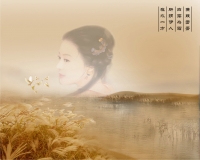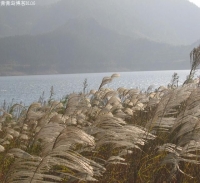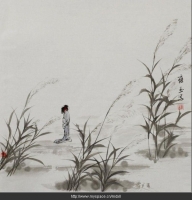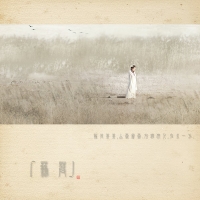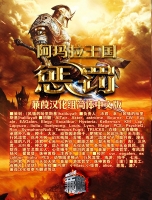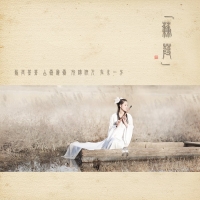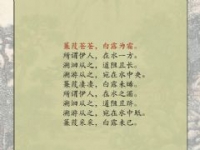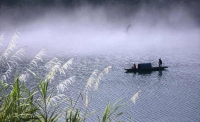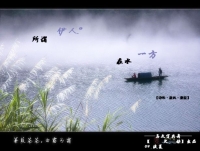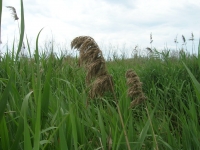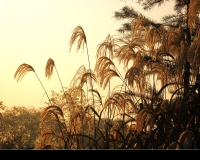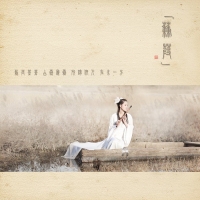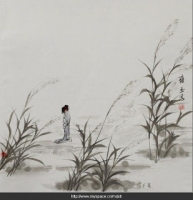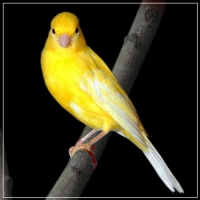阪有漆,隰有栗。既见君子,并坐鼓瑟。今者不乐,逝者其耋。
阪有桑,隰有杨。既见君子,并坐鼓簧。今者不乐,逝者其亡。
He has horses with their white foreheads.
Before we can see our prince,
We must get the services of eunuch.
On the hill-sides are varnish trees;
In the low wet grounds are chestnuts.
When we have seen our prince,
We sit together with him, and they play on their lutes.
If now we do not take our joy,
The time will pass till we are octogenarians.
On the hill-sides are mulberry trees;
In the low wet grounds are willows.
When we have seen our prince,
We sit together with him, and they play on their organs.
If now we do not take our joy,
The time will pass till we are no more.
奉时辰牡,辰牡孔硕。公曰左之,舍拔则获。
游于北园,四马既闲。輶车鸾镳,载猃歇骄。
The six reins are in the hand [of the charioteer].
The ruler's favourites,
Follow him to the chase.
The male animals of the season are made to present themselves,
The males in season, of very large size.
The ruler says, ' To the left of them; '
Then he lets go his arrows and hits.
He rambles in the northern park;
His four horses display their training.
Light carriages, with bells at the horses' bits,
Convey the long and short-mouthed dogs.
言念君子,温其如玉。在其板屋,乱我心曲。
四牡孔阜,六辔在手。骐骝是中,騧骊是骖。龙盾之合,鋈以觼軜。
言念君子,温其在邑。方何为期?胡然我念之!
俴驷孔群,厹矛鋈錞。蒙伐有苑,虎韔镂膺。交韔二弓,竹闭绲縢。
言念君子,载寝载兴。厌厌良人,秩秩德音。
With the ridge-like end of its pole, elegantly bound in five places;
With its slip rings and side straps,
And the traces attached by gilt rings to the masked transverse;
With its beautiful mat of tiger's skin, and its long naves;
With its piebalds, and horses with white left feet.
When I think of my husband [thus],
Looking bland and soft as a piece of jade;
Living there in his blank house;
It sends confusion into all the corners of my heart.
His four horses are in very fine condition,
And the six reins are in the hand [of the charioteer].
Piebald, and bay with black mane, are the insides;
Yellow with black mouth, and black, are the outsides;
Side by side are placed the dragon-figured shields;
Gilt are the buckles for the inner reins.
I think of my husband [thus],
Looking so mild in the cities there.
What time can be fixed for his return?
Oh! how I think of him!
His mail-covered team moves in great harmony;
There are the trident spears with their gilt ends;
And the beautiful feather-figured shield;
With the tiger-skin bow-case, and the carved metal ornaments on its front.
The two bows are placed in the case,
Bound with string to their bamboo frames.
I think of my husband,
When I lie down and rise up.
Tranquil and serene is the good man,
With his virtuous fame spread far and near.
蒹葭萋萋,白露未晞。所谓伊人,在水之湄。溯洄从之,道阻且跻。溯游从之,宛在水中坻。
蒹葭采采,白露未已。所谓伊人,在水之涘。溯洄从之,道阻且右。溯游从之,宛在水中沚。
And the white dew is turned into hoarfrost.
The man of whom I think,
Is somewhere about the water.
I go up the stream in quest of him,
But the way is difficult and long.
I go down the stream in quest of him,
And lo! he is right in the midst of the water.
The reeds and rushes are luxuriant,
And the white dew is not yet dry.
The man of whom I think,
Is on the margin of the water.
I go up the stream in quest of him,
But the way is difficult and steep.
I go down the stream in quest of him,
And lo! he is on the islet in the midst of the water.
The reeds and rushes are abundant,
And the white dew is not yet ceased.
The man of whom I think,
Is on the bank of the river.
I go up the stream in quest of him,
But the way is difficult and turns to the right.
I go down the stream in quest of him,
And lo! he is on the island in the midst of the water.
【注释】 ①蒹,荻。葭,苇。多隆阿曰:“荻之高者不过五六尺,苇之高者至丈余;荻茎细如蒿梗,苇之大者则如小竹;苇之中实,荻之中空,二草之别在此也。”
②毛传:“逆流而上曰溯洄,顺流而涉日溯游。”
③萋萋,释文:“本亦作‘凄’。”张慎仪曰:“《说文》:‘萋,草盛也。”凄,雨云起也。’此诗应以萋为正字。”徐礅曰:“《四月》诗传:‘凄凄,凉风也。’《绿衣》诗传:‘凄,寒风也。’《蒹葭》当霜凝之候,凉风萧瑟,寒意凄其,既盛而将痱矣。”据此,是读“萋”,可以读出景象;读“凄”,则并景中之情,或曰视觉中的感觉,亦可解得。
④毛传:“晞,干也。”
⑤毛传:“湄,水赚也。跻,升也。”郑笺:“言其难至如升阪。”按湄,《尔雅·释水》:“水草交为湄。”李巡注:“水中有草木交会曰湄。”又毛传曰“水赚”者,胡承珙曰:“《说文》‘赚,崖也。”崖,高边也。’下文‘道阻且跻’,跻为升义,故此以‘水隒’见其高意。”
⑥毛传:“涘,厓也。”郑笺:“‘右’者,言其迂回也。”焦琳日:“道阻且长、且跻、且右,皆因溯游逆流之故,意中觉得必是如此,无认作真有别样阻滞也。”李九华曰:“《尔雅》‘小洲曰渚,小渚曰址,小沚曰坻’,皆绝小之称。”
【译文】
浩荡芦苇莽苍苍,清晰白露化为霜。
心湖摇曳惟有她,伶俜站立水一方.
逆流而上相跟从,奈何道艰漫且长.
顺流而下互追随,已然她在水中央.
茂密芦苇盛萋萋,犹湿白露映霞光
心湖荡漾惟有她,依偎水草连岸旁
逆流而上相跟从,奈何路弯崎山冈
顺流而下互追随,隐约淡坐孤石上
葳蕤芦苇郁葱葱,晶莹白露烁光芒
心湖涟漪惟有她,悠然徜徉水岸乡
逆流而上相跟从,奈何途曲径如肠
顺流而下互追随,了却沙洲寂寞伤
【译文二】
苍苍的芦苇啊,
你那白露已凝结成美丽的晨霜;
我那倾心的人啊,
似就摇曳在那秋水茫茫的远方。
我要逆水而上哦,
但道路艰难、路途漫长!
我要顺水而下哦,
她仿佛在那茫茫水域的中央!
萋萋的芦苇啊,
你那白露已映衬着东方的霞光;
我那倾心的人啊,
似就依偎在那水草相连的岸旁。
我要逆水而上哦,
但道路艰难、崎岖山冈!
我要顺水而下哦,
她仿佛就在那水中的孤石上。
采采的芦苇啊,
你那白露已辉映着朝日的光芒;
我那倾心的人啊,
似就轻吟在那绚丽水滨的岸乡。
我要逆水而上哦,
但道路艰难、曲折如肠!
我要顺水而下哦,
她仿佛就在那水中的沙洲上……
【赏析】
《蒹葭》属于秦风。周孝王时,秦之先祖非子受封于秦谷(今甘肃天水)。平王东迁时,秦襄公因出兵护送有功,又得到了岐山以西的大片封地。后来秦逐渐东徙,都于雍(今陕西兴平)。秦地包括现在陕西关中到甘肃东南部一带。秦风共十篇,大都是东周时代这个区域的民歌。
对这首怀人诗,历来解说不一。有人认为作者在思念恋人,诗的主旨是写爱情;有人说是诗人借怀友讽刺秦襄公不能礼贤下士,致使贤士隐居、不肯出来做官;也有人说作者就是隐士,此诗乃明志之作。我们细味诗意,诗中并未明确显示男女恋情,况且“伊人”是男是女也难判定。说它是讽刺诗则更无根据。因此,我们只把“伊人”视为作者所敬仰和热爱的人,至于是男是女,且不论及。
“蒹葭苍苍,白露为霜”两句,从物象与色泽上点明了时间和环境。那生长在河边的茂密芦苇,颜色苍青,那晶莹透亮的露水珠已凝结成白刷刷的浓霜,那微微的秋风送着袭人的凉意,那茫茫的秋水泛起浸人的寒气。在这一苍凉幽缈的深秋清晨的特定时空里,诗人时而静立,时而徘徊,时而翘首眺望,时而蹙眉沉思。他那神情焦灼、心绪不宁的情状,不时地显现于我们眼前,原来他是在思慕追寻着一个友人。“所谓伊人,在水一方”两句,交代了诗人所追慕的对象及伊人所在的地点,表现了诗人思见心切,望穿秋水,一个劲地张望、寻求。“伊人”,指与诗人关系亲密、为诗人崇敬和热爱而未曾须臾忘怀的人。“所谓”二字,表明“伊人”是常常被提及,不断念叨着的,然而现在他却在漫漫大河的另一方。“在水一方”,语气肯定,说明诗人确信他的存在,并充满信心去追求,只是河水隔绝,相会不易。“溯洄从之,道阻且长;溯游从之,宛在水中央。”沿着河边小道向上游走去,道路艰险,且又漫长,即使花费很长时间也难到达;如果径直游渡过去,尽管相距不远,但眼前秋水茫茫,思之可及,行之不易,仿佛看到了伊人的身影在水中央晃动。诗人尽管立于河边,但他那恍惚迷离的心神早已飞动起来,思见伊人而不得的如醉如痴的形象栩栩可见。诗句之奇妙,正如方玉润所说:“玩其词,虽若可望不可即。味其意,实求之而不远,思之而即至者。”(《诗经原始》)
诗的二、三章只换了几个词儿,内容与首章基本相同。但它体现了诗歌咏唱的音乐特点,增强了韵律的悠扬和谐美,使表达的情感愈来愈强烈。首章的“苍苍”,次章的“凄凄”,末章的“采采”,写出芦苇的颜色由苍青至凄青到泛白,把深秋凄凉的气氛渲染得越来越浓,烘托出诗人当时所在的环境十分清冷,心境十分寂寞。白露“为霜”、“未晞”、“未已”的变换,描绘出朝露成霜而又融为秋水的渐变情状与过程,形象地画出了时间发展的轨迹,说明诗人天刚放亮就来到河滨,直呆到太阳东升。试想,他独自一人久久徘徊在清冷索寞的旷野,面对茫茫秋水,等人不见,寻人不着,其心情该是何等焦急和惆怅!描写伊人所在地点时,由于“方”、“湄”、“涘”三字的变换,就把伊人在彼岸等待诗人和诗人盼望与伊人相会的活动与心理形象而真切地描绘了出来,这样写,大大拓宽了诗的意境。另外,像“长”、“跻”、“右”和“央”、“坻”、“沚”的变换,也都从不同的道路和方位上描述了他寻见伊人困难重重,想见友人心情急切的情景。若把三章诗所用几组变换的词语联系起来加以品味,更能体会到诗的隽永淳厚的意味。
诗的每章开头都采用了赋中见兴的笔法。通过对眼前真景的描写与赞叹,绘画出一个空灵缥缈的意境,笼罩全篇。诗人抓住秋色独有的特征,不惜用浓墨重彩反复进行描绘、渲染深秋空寂悲凉的氛围,以抒写诗人怅然若失而又热烈企慕友人的心境。正如《人间词话》所说:“《诗·蒹葭》一篇,最得风人深致。”具有“以我观物,故物皆著我之色彩”和“其言情也必沁人心脾;其写景也必豁人耳目;其辞脱口而出,无矫揉妆束之态。”
这首被人传诵不已的诗,对后世的影响也是明显的。且看宋玉《九辩》中的一段描写:“悲哉秋之为气也!萧瑟兮草木摇落而变衰;憭慄兮若在远行;登山临水兮送将归;泬寥兮天高而气清;寂兮收潦而水清;憯凄增欷兮薄寒之中人。”这里通过对秋天的气象和草木摇落的情状的描写,制造一种肃杀的气氛,表达了诗人悲凉凄苦的心情。这也许是受了《蒹葭》诗的影响,由此可以窥见《楚辞》对《诗经》的继承和发展线索。《古诗十九首》中《西北有高楼》的发端,赋中见兴、以景托情的写法,也沿用了《蒹葭》诗的笔法。其后的曹丕,从本诗中化出了“秋风萧瑟天气凉,草木摇落露为霜”的诗句。由此可见,《蒹葭》诗在古代诗歌史上有着很重要的地位。
(周鲁,选自《中华文学鉴赏宝库》,陕西人民教育出版社1995年版)
终南何有?有纪有堂。君子至止,黻衣绣裳。佩玉将将,寿考不忘!
There are white firs and plum trees.
Our prince has arrived at it,
Wearing an embroidered robe over his fox-fur,
And with his countenance rouged as with vermilion.
May he prove a ruler indeed!
What are there on Zhongnan?
There are nooks and open glades.
Our prince has arrived at it,
With the symbol of distinction embroidered on his lower garment,
And the gems at his girdle emitting their thinking.
May long life and an endless name be his?
临其穴,惴惴其栗。彼苍者天,歼我良人!如可赎兮,人百其身!
交交黄鸟,止于桑。谁从穆公?子车仲行。维此仲行,百夫之防。
临其穴,惴惴其栗。彼苍者天,歼我良人!如可赎兮,人百其身!
交交黄鸟,止于楚。谁从穆公?子车针虎。维此针虎,百夫之御。
临其穴,惴惴其栗。彼苍者天,歼我良人!如可赎兮,人百其身!
And rest upon the jujube trees.
Who followed duke Mu [to the grave]?
Ziche Yansi.
And this Yansi,
Was a man above a hundred.
When he came to the grave,
He looked terrified and trembled.
Thou azure Heaven there!
Thou art destroying our good men.
Could he have been redeemed,
We should have given a hundred lives for him.
They flit about, the yellow birds,
And rest upon the mulberry trees.
Who followed duke Mu [to the grave]?
Ziche Zhongheng.
And this Zhongheng,
Was a match for a hundred.
When he came to the grave,
He looked terrified and trembled.
Thou azure Heaven there!
Thou art destroying our good men.
Could he have been redeemed,
We should have given a hundred lives for him.
They flit about, the yellow birds,
And rest upon the thorn trees.
Who followed duke Mu [to the grave]?
Ziche Qianhu.
And this Ziche Qianhu,
Could withstand a hundred men.
When he came to the grave,
He looked terrified and trembled.
Thou azure Heaven there!
Thou art destroying our good men.
Could he have been redeemed,
We should have given a hundred lives for him.
山有苞栎,隰有六駮。未见君子,忧心靡乐。如何如何,忘我实多!
山有苞棣,隰有树檖。未见君子,忧心如醉。如何如何,忘我实多!
To the thick-wooded forest in the north.
While I do not see my husband,
My heart cannot forget its grief.
How is it, how is it,
That he forgets me so very much?
On the mountain are the bushy oaks;
In the low wet grounds are six elms.
While I do not see my husband,
My sad heart has no joy.
How is it, how is it,
That he forgets me so very much?
On the mountain are the bushy sparrow-plums;
In the low wet grounds are the high, wild pear trees.
While I do not see my husband,
My heart is as if intoxicated with grief.
How is it, how is it,
That he forgets me so very much?
岂曰无衣?与子同泽。王于兴师,修我矛戟。与子偕作!
岂曰无衣?与子同裳。王于兴师,修我甲兵。与子偕行!
I will share my long robes with you.
The king is raising his forces;
I will prepare my lance and spear,
And will be your comrade.
How shall it be said that you have no clothes?
I will share my under clothes with you.
The king is raising his forces;
I will prepare my spear and lance,
And will take the field with you.
How shall it be said that you have no clothes?
I will share my lower garments with you.
The king is raising his forces;
I will prepare my buffcoat and sharp weapons,
And will march along with you.
我送舅氏,悠悠我思。何以赠之?琼瑰玉佩。
To the north of the Wei,
What did I present to him?
Four bay horses for his carriage of state.
I escorted my mother's nephew,
Long, long did I think of him.
What did I present to him?
A precious jasper, and gems for his girdle-pendant.
於我乎,每食四簋,今也每食不饱。于嗟乎,不承权舆!
But now at every meal there is nothing left.
Alas that he could not continue as he began!
He assigned us at every meal four dishes of grain;
But now at every meal we do not get our fill.
Alas that he could not continue as he began!

